THT2114: Sustainable Operations - Uganda Tourism Case Study
VerifiedAdded on 2023/06/11
|10
|1871
|68
Case Study
AI Summary
This case study report analyzes the sustainable tourism landscape in Uganda, addressing key issues and challenges within its developing tourism industry. It highlights factors influencing Uganda's tourism competitiveness, including marketing limitations, competition from neighboring countries, and service delivery issues. The report also examines the role of resorts like Ruhija Gorilla Friends in promoting sustainable practices. Recommendations are provided to enhance Uganda's tourism sector, emphasizing market monitoring, increased investment, public-private partnerships, regional cooperation, and improved service quality. The analysis aims to contribute to the sustainable development and promotion of tourism in Uganda.
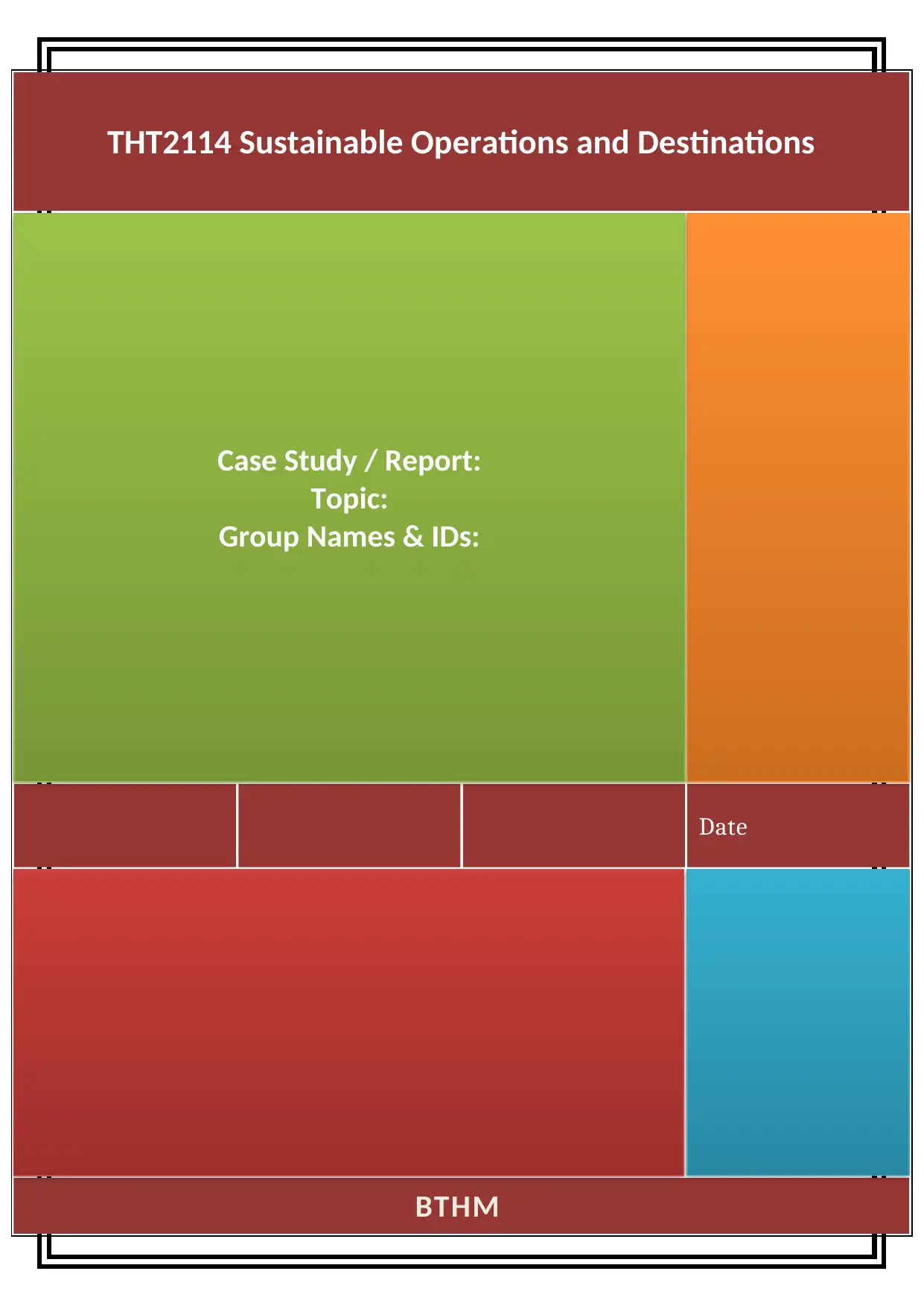
BTHM
Date
Case Study / Report:
Topic:
Group Names & IDs:
THT2114 Sustainable Operations and Destinations
Date
Case Study / Report:
Topic:
Group Names & IDs:
THT2114 Sustainable Operations and Destinations
Paraphrase This Document
Need a fresh take? Get an instant paraphrase of this document with our AI Paraphraser
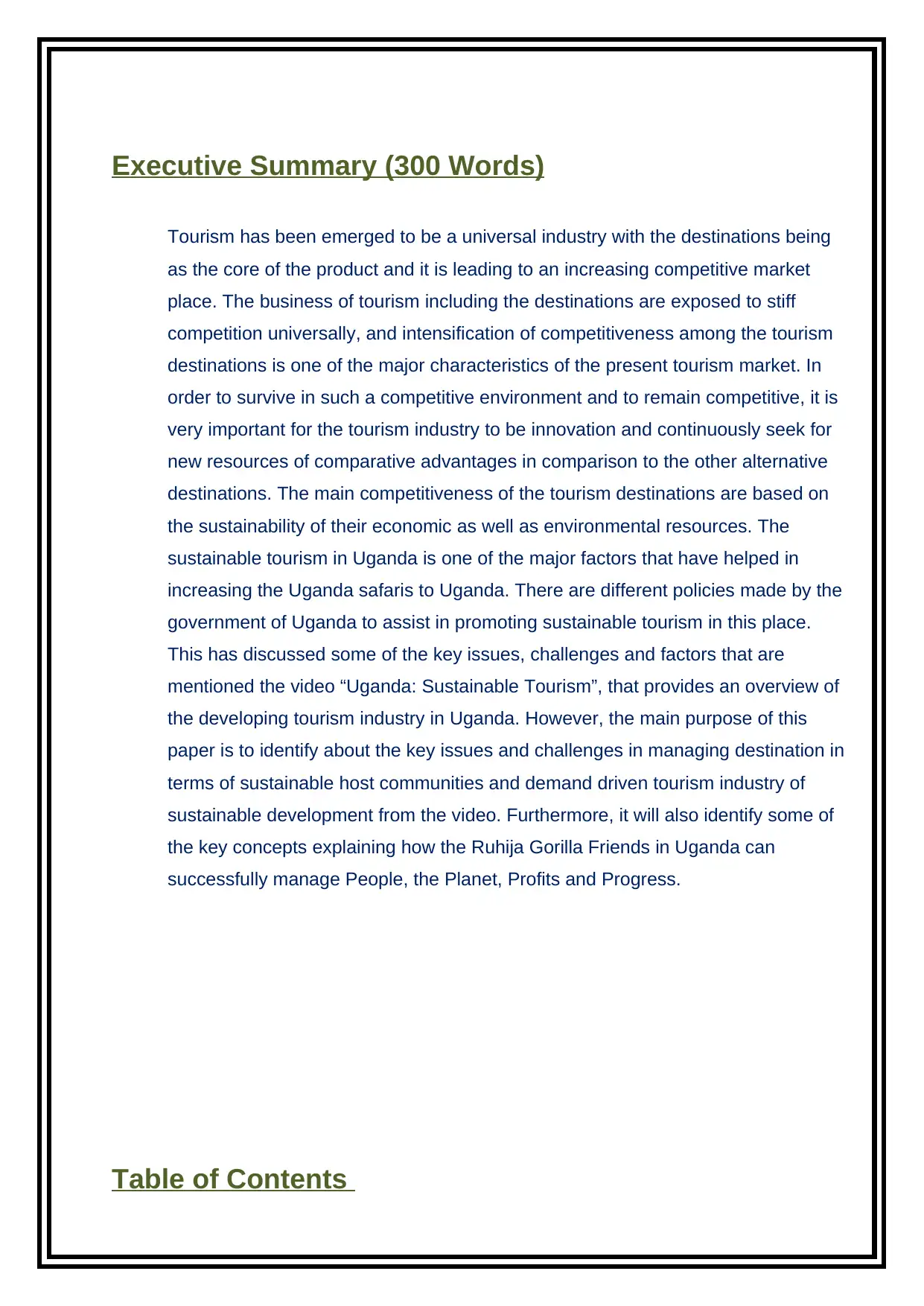
Executive Summary (300 Words)
Tourism has been emerged to be a universal industry with the destinations being
as the core of the product and it is leading to an increasing competitive market
place. The business of tourism including the destinations are exposed to stiff
competition universally, and intensification of competitiveness among the tourism
destinations is one of the major characteristics of the present tourism market. In
order to survive in such a competitive environment and to remain competitive, it is
very important for the tourism industry to be innovation and continuously seek for
new resources of comparative advantages in comparison to the other alternative
destinations. The main competitiveness of the tourism destinations are based on
the sustainability of their economic as well as environmental resources. The
sustainable tourism in Uganda is one of the major factors that have helped in
increasing the Uganda safaris to Uganda. There are different policies made by the
government of Uganda to assist in promoting sustainable tourism in this place.
This has discussed some of the key issues, challenges and factors that are
mentioned the video “Uganda: Sustainable Tourism”, that provides an overview of
the developing tourism industry in Uganda. However, the main purpose of this
paper is to identify about the key issues and challenges in managing destination in
terms of sustainable host communities and demand driven tourism industry of
sustainable development from the video. Furthermore, it will also identify some of
the key concepts explaining how the Ruhija Gorilla Friends in Uganda can
successfully manage People, the Planet, Profits and Progress.
Table of Contents
Tourism has been emerged to be a universal industry with the destinations being
as the core of the product and it is leading to an increasing competitive market
place. The business of tourism including the destinations are exposed to stiff
competition universally, and intensification of competitiveness among the tourism
destinations is one of the major characteristics of the present tourism market. In
order to survive in such a competitive environment and to remain competitive, it is
very important for the tourism industry to be innovation and continuously seek for
new resources of comparative advantages in comparison to the other alternative
destinations. The main competitiveness of the tourism destinations are based on
the sustainability of their economic as well as environmental resources. The
sustainable tourism in Uganda is one of the major factors that have helped in
increasing the Uganda safaris to Uganda. There are different policies made by the
government of Uganda to assist in promoting sustainable tourism in this place.
This has discussed some of the key issues, challenges and factors that are
mentioned the video “Uganda: Sustainable Tourism”, that provides an overview of
the developing tourism industry in Uganda. However, the main purpose of this
paper is to identify about the key issues and challenges in managing destination in
terms of sustainable host communities and demand driven tourism industry of
sustainable development from the video. Furthermore, it will also identify some of
the key concepts explaining how the Ruhija Gorilla Friends in Uganda can
successfully manage People, the Planet, Profits and Progress.
Table of Contents
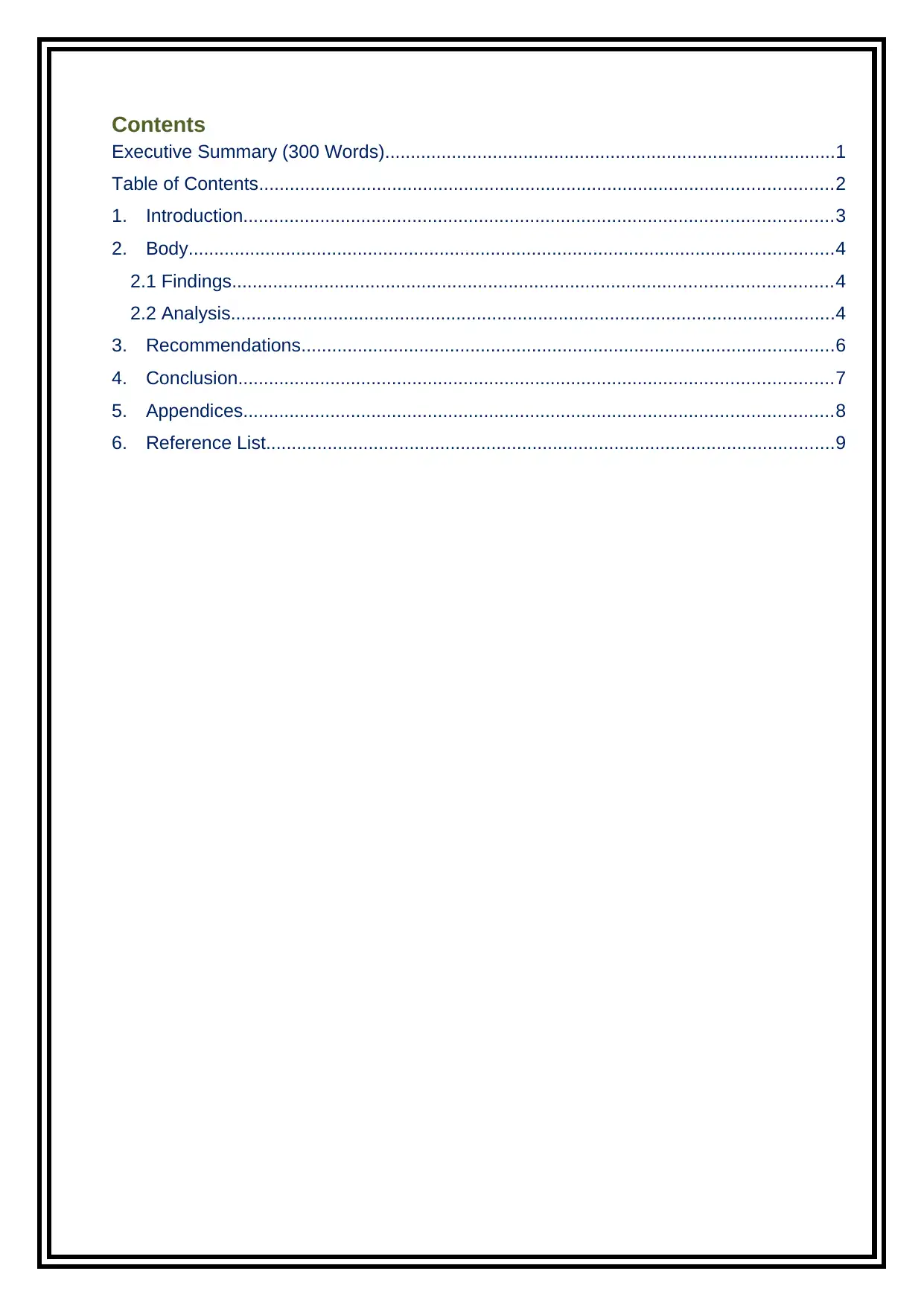
Contents
Executive Summary (300 Words)........................................................................................1
Table of Contents................................................................................................................2
1. Introduction...................................................................................................................3
2. Body..............................................................................................................................4
2.1 Findings.....................................................................................................................4
2.2 Analysis......................................................................................................................4
3. Recommendations........................................................................................................6
4. Conclusion....................................................................................................................7
5. Appendices...................................................................................................................8
6. Reference List...............................................................................................................9
Executive Summary (300 Words)........................................................................................1
Table of Contents................................................................................................................2
1. Introduction...................................................................................................................3
2. Body..............................................................................................................................4
2.1 Findings.....................................................................................................................4
2.2 Analysis......................................................................................................................4
3. Recommendations........................................................................................................6
4. Conclusion....................................................................................................................7
5. Appendices...................................................................................................................8
6. Reference List...............................................................................................................9
⊘ This is a preview!⊘
Do you want full access?
Subscribe today to unlock all pages.

Trusted by 1+ million students worldwide
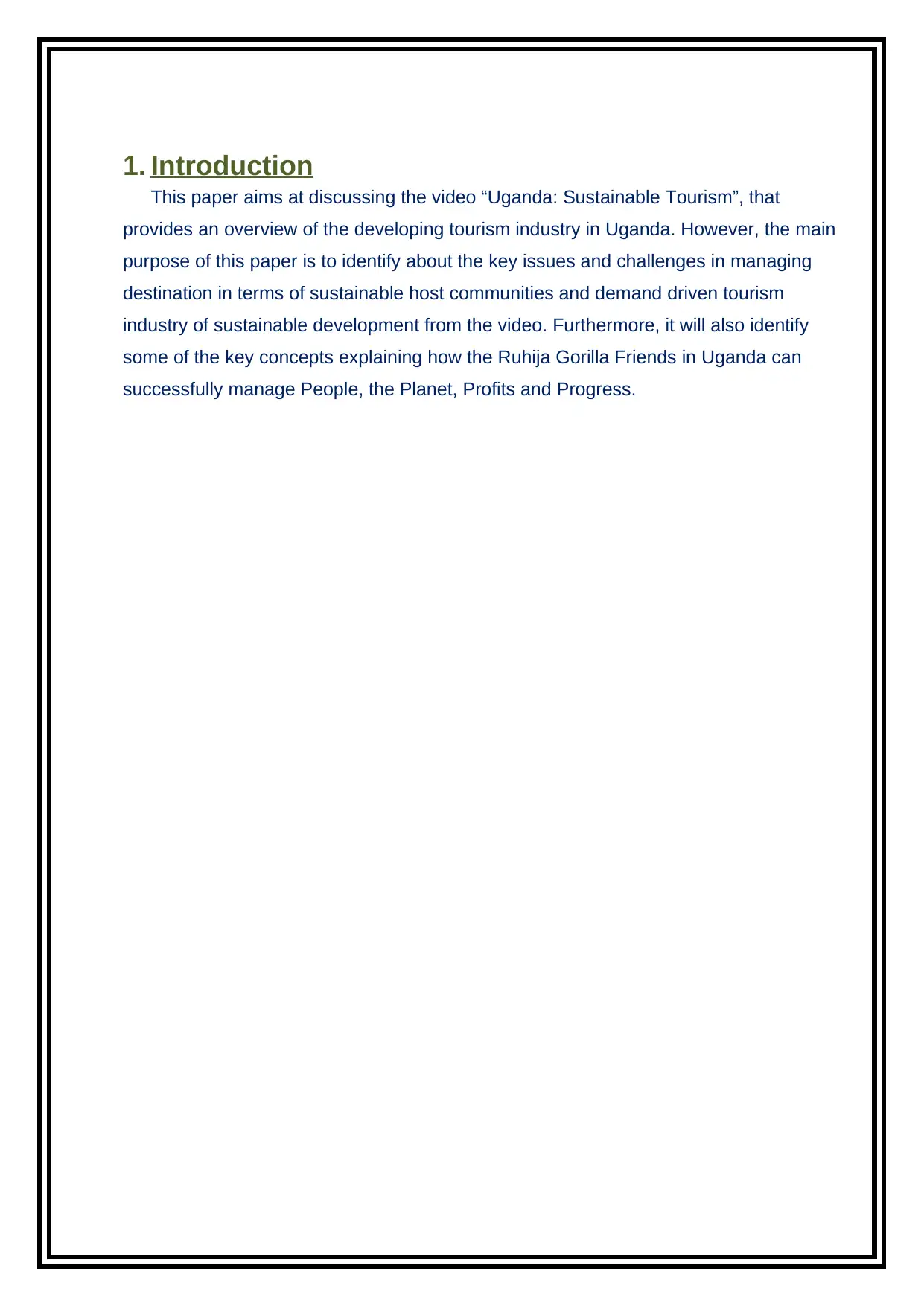
1. Introduction
This paper aims at discussing the video “Uganda: Sustainable Tourism”, that
provides an overview of the developing tourism industry in Uganda. However, the main
purpose of this paper is to identify about the key issues and challenges in managing
destination in terms of sustainable host communities and demand driven tourism
industry of sustainable development from the video. Furthermore, it will also identify
some of the key concepts explaining how the Ruhija Gorilla Friends in Uganda can
successfully manage People, the Planet, Profits and Progress.
This paper aims at discussing the video “Uganda: Sustainable Tourism”, that
provides an overview of the developing tourism industry in Uganda. However, the main
purpose of this paper is to identify about the key issues and challenges in managing
destination in terms of sustainable host communities and demand driven tourism
industry of sustainable development from the video. Furthermore, it will also identify
some of the key concepts explaining how the Ruhija Gorilla Friends in Uganda can
successfully manage People, the Planet, Profits and Progress.
Paraphrase This Document
Need a fresh take? Get an instant paraphrase of this document with our AI Paraphraser
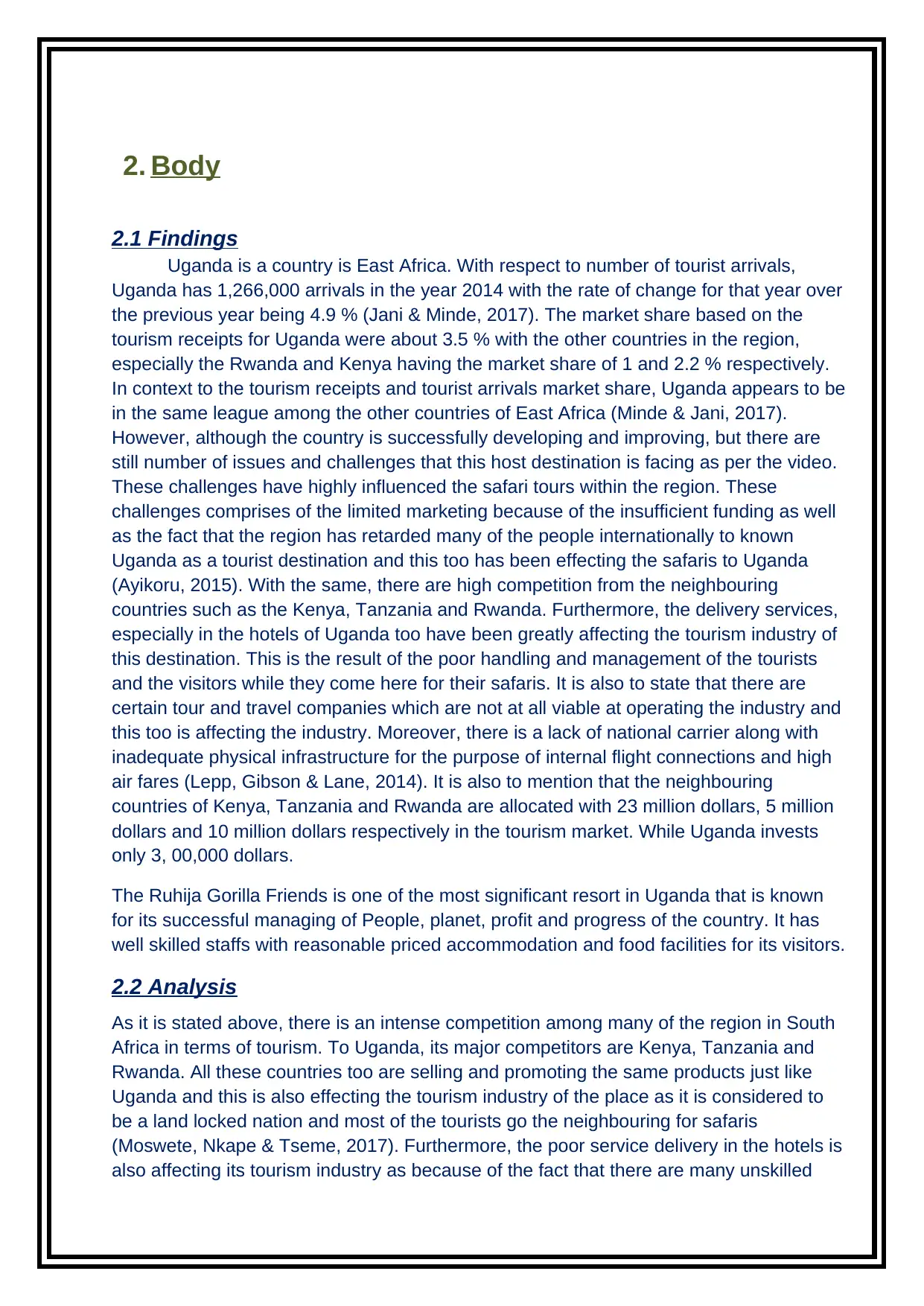
2. Body
2.1 Findings
Uganda is a country is East Africa. With respect to number of tourist arrivals,
Uganda has 1,266,000 arrivals in the year 2014 with the rate of change for that year over
the previous year being 4.9 % (Jani & Minde, 2017). The market share based on the
tourism receipts for Uganda were about 3.5 % with the other countries in the region,
especially the Rwanda and Kenya having the market share of 1 and 2.2 % respectively.
In context to the tourism receipts and tourist arrivals market share, Uganda appears to be
in the same league among the other countries of East Africa (Minde & Jani, 2017).
However, although the country is successfully developing and improving, but there are
still number of issues and challenges that this host destination is facing as per the video.
These challenges have highly influenced the safari tours within the region. These
challenges comprises of the limited marketing because of the insufficient funding as well
as the fact that the region has retarded many of the people internationally to known
Uganda as a tourist destination and this too has been effecting the safaris to Uganda
(Ayikoru, 2015). With the same, there are high competition from the neighbouring
countries such as the Kenya, Tanzania and Rwanda. Furthermore, the delivery services,
especially in the hotels of Uganda too have been greatly affecting the tourism industry of
this destination. This is the result of the poor handling and management of the tourists
and the visitors while they come here for their safaris. It is also to state that there are
certain tour and travel companies which are not at all viable at operating the industry and
this too is affecting the industry. Moreover, there is a lack of national carrier along with
inadequate physical infrastructure for the purpose of internal flight connections and high
air fares (Lepp, Gibson & Lane, 2014). It is also to mention that the neighbouring
countries of Kenya, Tanzania and Rwanda are allocated with 23 million dollars, 5 million
dollars and 10 million dollars respectively in the tourism market. While Uganda invests
only 3, 00,000 dollars.
The Ruhija Gorilla Friends is one of the most significant resort in Uganda that is known
for its successful managing of People, planet, profit and progress of the country. It has
well skilled staffs with reasonable priced accommodation and food facilities for its visitors.
2.2 Analysis
As it is stated above, there is an intense competition among many of the region in South
Africa in terms of tourism. To Uganda, its major competitors are Kenya, Tanzania and
Rwanda. All these countries too are selling and promoting the same products just like
Uganda and this is also effecting the tourism industry of the place as it is considered to
be a land locked nation and most of the tourists go the neighbouring for safaris
(Moswete, Nkape & Tseme, 2017). Furthermore, the poor service delivery in the hotels is
also affecting its tourism industry as because of the fact that there are many unskilled
2.1 Findings
Uganda is a country is East Africa. With respect to number of tourist arrivals,
Uganda has 1,266,000 arrivals in the year 2014 with the rate of change for that year over
the previous year being 4.9 % (Jani & Minde, 2017). The market share based on the
tourism receipts for Uganda were about 3.5 % with the other countries in the region,
especially the Rwanda and Kenya having the market share of 1 and 2.2 % respectively.
In context to the tourism receipts and tourist arrivals market share, Uganda appears to be
in the same league among the other countries of East Africa (Minde & Jani, 2017).
However, although the country is successfully developing and improving, but there are
still number of issues and challenges that this host destination is facing as per the video.
These challenges have highly influenced the safari tours within the region. These
challenges comprises of the limited marketing because of the insufficient funding as well
as the fact that the region has retarded many of the people internationally to known
Uganda as a tourist destination and this too has been effecting the safaris to Uganda
(Ayikoru, 2015). With the same, there are high competition from the neighbouring
countries such as the Kenya, Tanzania and Rwanda. Furthermore, the delivery services,
especially in the hotels of Uganda too have been greatly affecting the tourism industry of
this destination. This is the result of the poor handling and management of the tourists
and the visitors while they come here for their safaris. It is also to state that there are
certain tour and travel companies which are not at all viable at operating the industry and
this too is affecting the industry. Moreover, there is a lack of national carrier along with
inadequate physical infrastructure for the purpose of internal flight connections and high
air fares (Lepp, Gibson & Lane, 2014). It is also to mention that the neighbouring
countries of Kenya, Tanzania and Rwanda are allocated with 23 million dollars, 5 million
dollars and 10 million dollars respectively in the tourism market. While Uganda invests
only 3, 00,000 dollars.
The Ruhija Gorilla Friends is one of the most significant resort in Uganda that is known
for its successful managing of People, planet, profit and progress of the country. It has
well skilled staffs with reasonable priced accommodation and food facilities for its visitors.
2.2 Analysis
As it is stated above, there is an intense competition among many of the region in South
Africa in terms of tourism. To Uganda, its major competitors are Kenya, Tanzania and
Rwanda. All these countries too are selling and promoting the same products just like
Uganda and this is also effecting the tourism industry of the place as it is considered to
be a land locked nation and most of the tourists go the neighbouring for safaris
(Moswete, Nkape & Tseme, 2017). Furthermore, the poor service delivery in the hotels is
also affecting its tourism industry as because of the fact that there are many unskilled
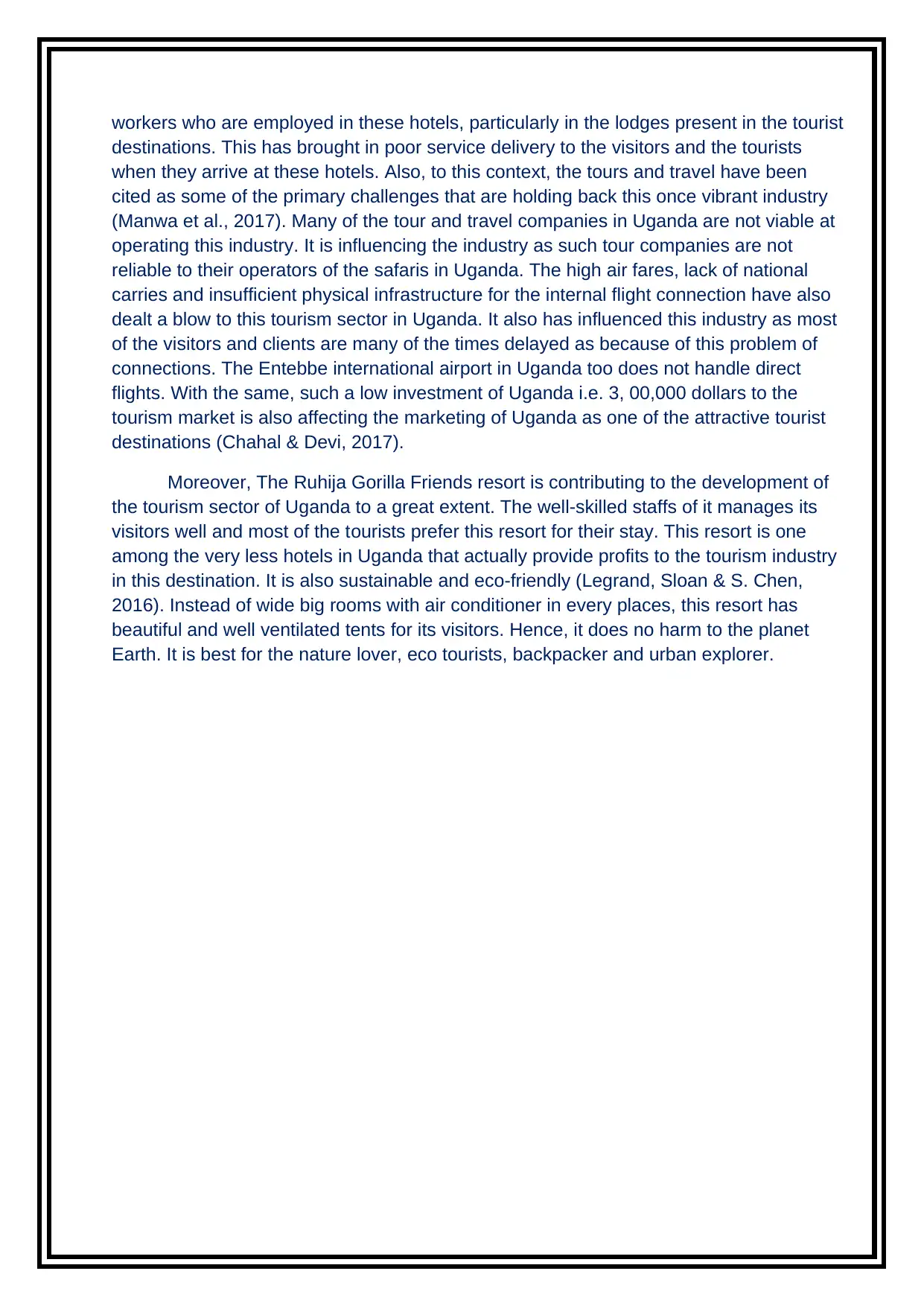
workers who are employed in these hotels, particularly in the lodges present in the tourist
destinations. This has brought in poor service delivery to the visitors and the tourists
when they arrive at these hotels. Also, to this context, the tours and travel have been
cited as some of the primary challenges that are holding back this once vibrant industry
(Manwa et al., 2017). Many of the tour and travel companies in Uganda are not viable at
operating this industry. It is influencing the industry as such tour companies are not
reliable to their operators of the safaris in Uganda. The high air fares, lack of national
carries and insufficient physical infrastructure for the internal flight connection have also
dealt a blow to this tourism sector in Uganda. It also has influenced this industry as most
of the visitors and clients are many of the times delayed as because of this problem of
connections. The Entebbe international airport in Uganda too does not handle direct
flights. With the same, such a low investment of Uganda i.e. 3, 00,000 dollars to the
tourism market is also affecting the marketing of Uganda as one of the attractive tourist
destinations (Chahal & Devi, 2017).
Moreover, The Ruhija Gorilla Friends resort is contributing to the development of
the tourism sector of Uganda to a great extent. The well-skilled staffs of it manages its
visitors well and most of the tourists prefer this resort for their stay. This resort is one
among the very less hotels in Uganda that actually provide profits to the tourism industry
in this destination. It is also sustainable and eco-friendly (Legrand, Sloan & S. Chen,
2016). Instead of wide big rooms with air conditioner in every places, this resort has
beautiful and well ventilated tents for its visitors. Hence, it does no harm to the planet
Earth. It is best for the nature lover, eco tourists, backpacker and urban explorer.
destinations. This has brought in poor service delivery to the visitors and the tourists
when they arrive at these hotels. Also, to this context, the tours and travel have been
cited as some of the primary challenges that are holding back this once vibrant industry
(Manwa et al., 2017). Many of the tour and travel companies in Uganda are not viable at
operating this industry. It is influencing the industry as such tour companies are not
reliable to their operators of the safaris in Uganda. The high air fares, lack of national
carries and insufficient physical infrastructure for the internal flight connection have also
dealt a blow to this tourism sector in Uganda. It also has influenced this industry as most
of the visitors and clients are many of the times delayed as because of this problem of
connections. The Entebbe international airport in Uganda too does not handle direct
flights. With the same, such a low investment of Uganda i.e. 3, 00,000 dollars to the
tourism market is also affecting the marketing of Uganda as one of the attractive tourist
destinations (Chahal & Devi, 2017).
Moreover, The Ruhija Gorilla Friends resort is contributing to the development of
the tourism sector of Uganda to a great extent. The well-skilled staffs of it manages its
visitors well and most of the tourists prefer this resort for their stay. This resort is one
among the very less hotels in Uganda that actually provide profits to the tourism industry
in this destination. It is also sustainable and eco-friendly (Legrand, Sloan & S. Chen,
2016). Instead of wide big rooms with air conditioner in every places, this resort has
beautiful and well ventilated tents for its visitors. Hence, it does no harm to the planet
Earth. It is best for the nature lover, eco tourists, backpacker and urban explorer.
⊘ This is a preview!⊘
Do you want full access?
Subscribe today to unlock all pages.

Trusted by 1+ million students worldwide
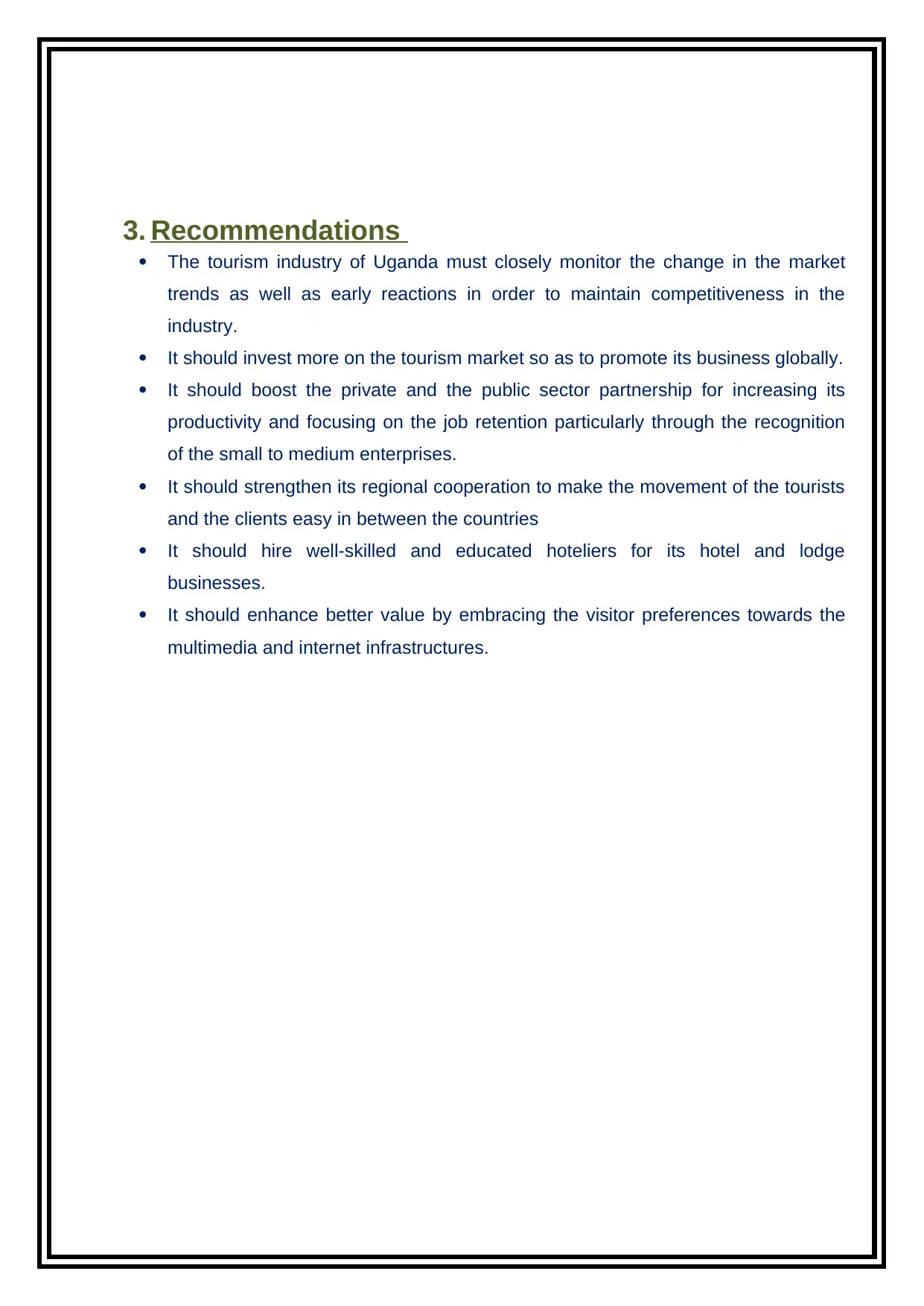
3. Recommendations
The tourism industry of Uganda must closely monitor the change in the market
trends as well as early reactions in order to maintain competitiveness in the
industry.
It should invest more on the tourism market so as to promote its business globally.
It should boost the private and the public sector partnership for increasing its
productivity and focusing on the job retention particularly through the recognition
of the small to medium enterprises.
It should strengthen its regional cooperation to make the movement of the tourists
and the clients easy in between the countries
It should hire well-skilled and educated hoteliers for its hotel and lodge
businesses.
It should enhance better value by embracing the visitor preferences towards the
multimedia and internet infrastructures.
The tourism industry of Uganda must closely monitor the change in the market
trends as well as early reactions in order to maintain competitiveness in the
industry.
It should invest more on the tourism market so as to promote its business globally.
It should boost the private and the public sector partnership for increasing its
productivity and focusing on the job retention particularly through the recognition
of the small to medium enterprises.
It should strengthen its regional cooperation to make the movement of the tourists
and the clients easy in between the countries
It should hire well-skilled and educated hoteliers for its hotel and lodge
businesses.
It should enhance better value by embracing the visitor preferences towards the
multimedia and internet infrastructures.
Paraphrase This Document
Need a fresh take? Get an instant paraphrase of this document with our AI Paraphraser
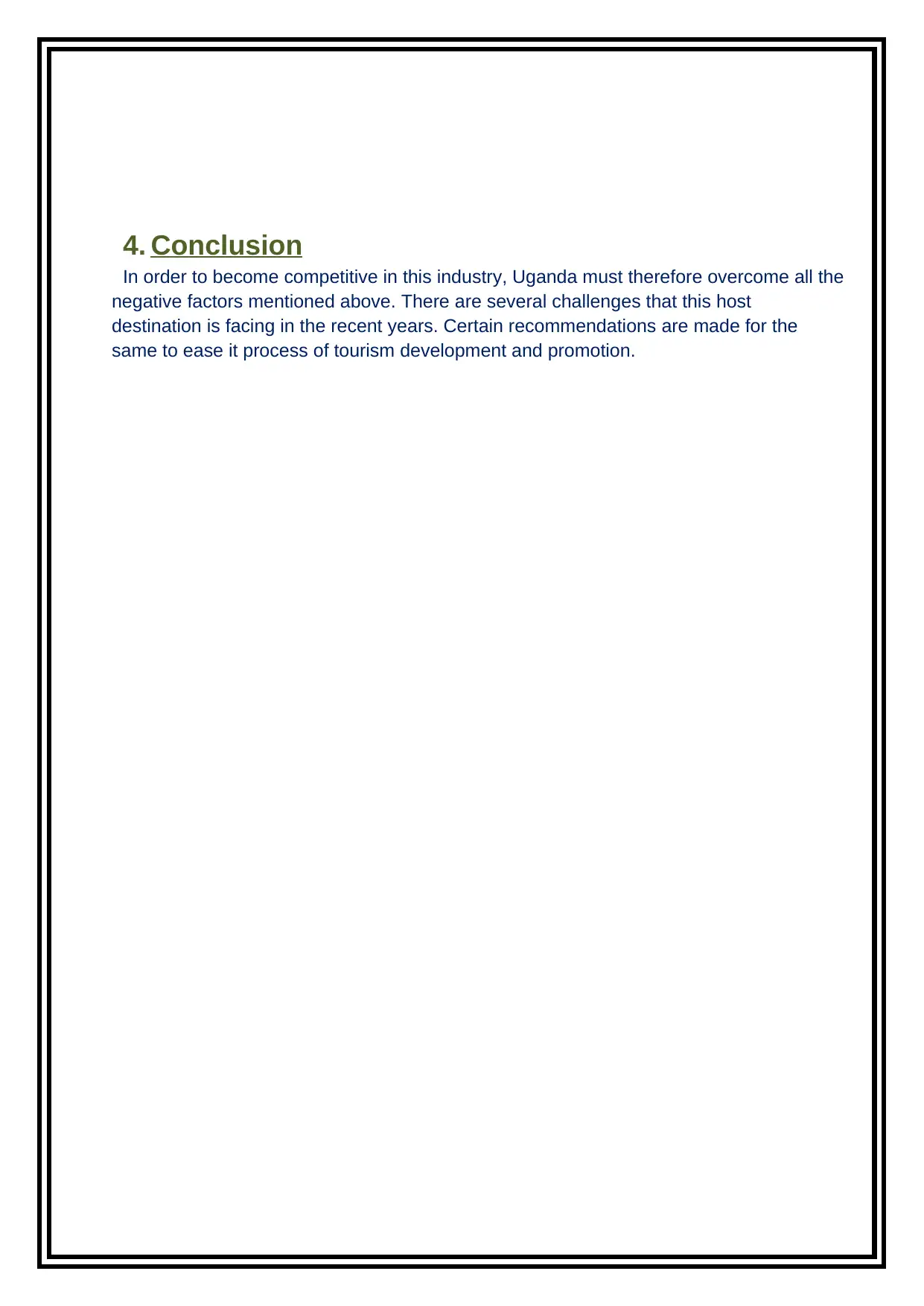
4. Conclusion
In order to become competitive in this industry, Uganda must therefore overcome all the
negative factors mentioned above. There are several challenges that this host
destination is facing in the recent years. Certain recommendations are made for the
same to ease it process of tourism development and promotion.
In order to become competitive in this industry, Uganda must therefore overcome all the
negative factors mentioned above. There are several challenges that this host
destination is facing in the recent years. Certain recommendations are made for the
same to ease it process of tourism development and promotion.
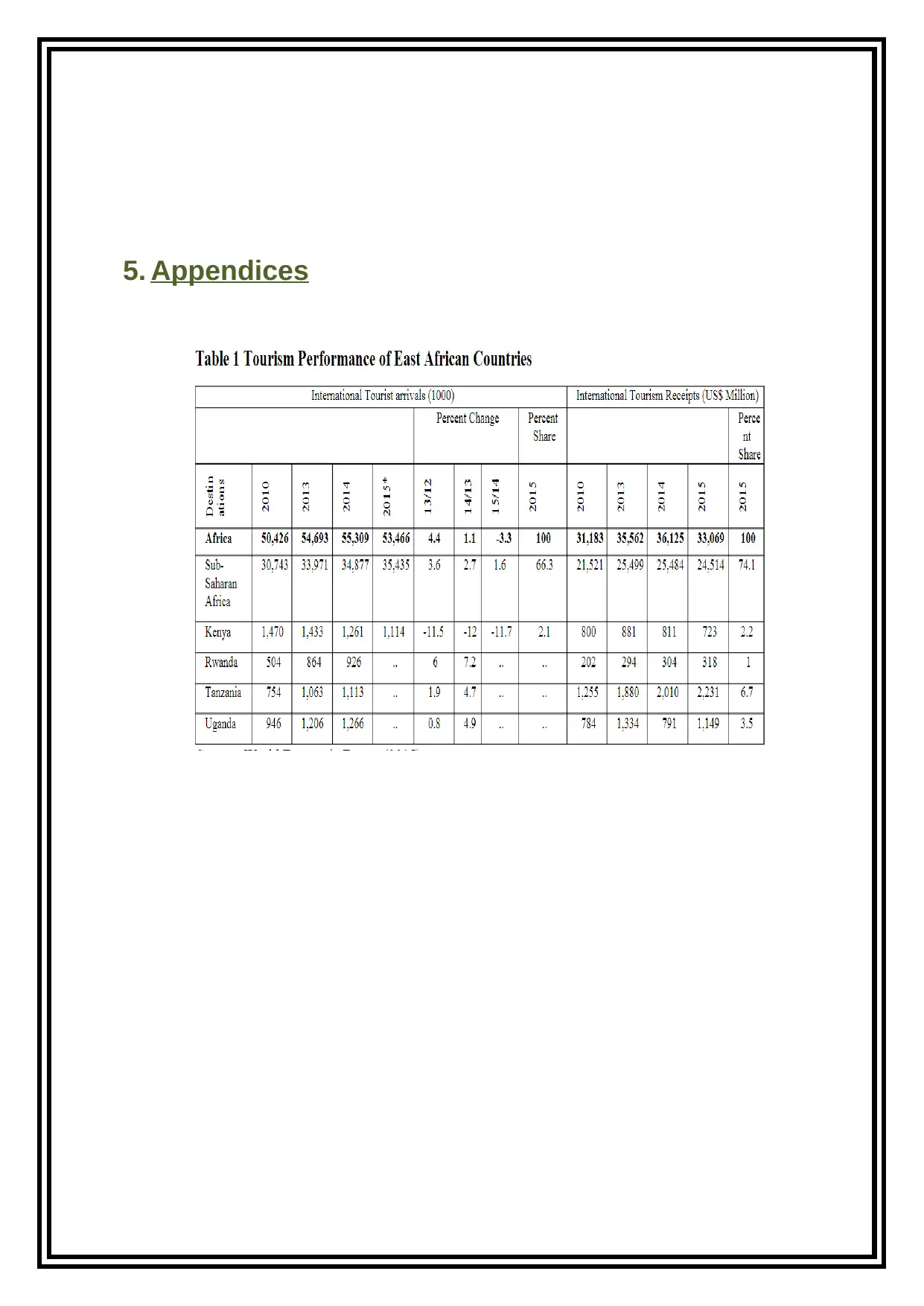
5. Appendices
⊘ This is a preview!⊘
Do you want full access?
Subscribe today to unlock all pages.

Trusted by 1+ million students worldwide
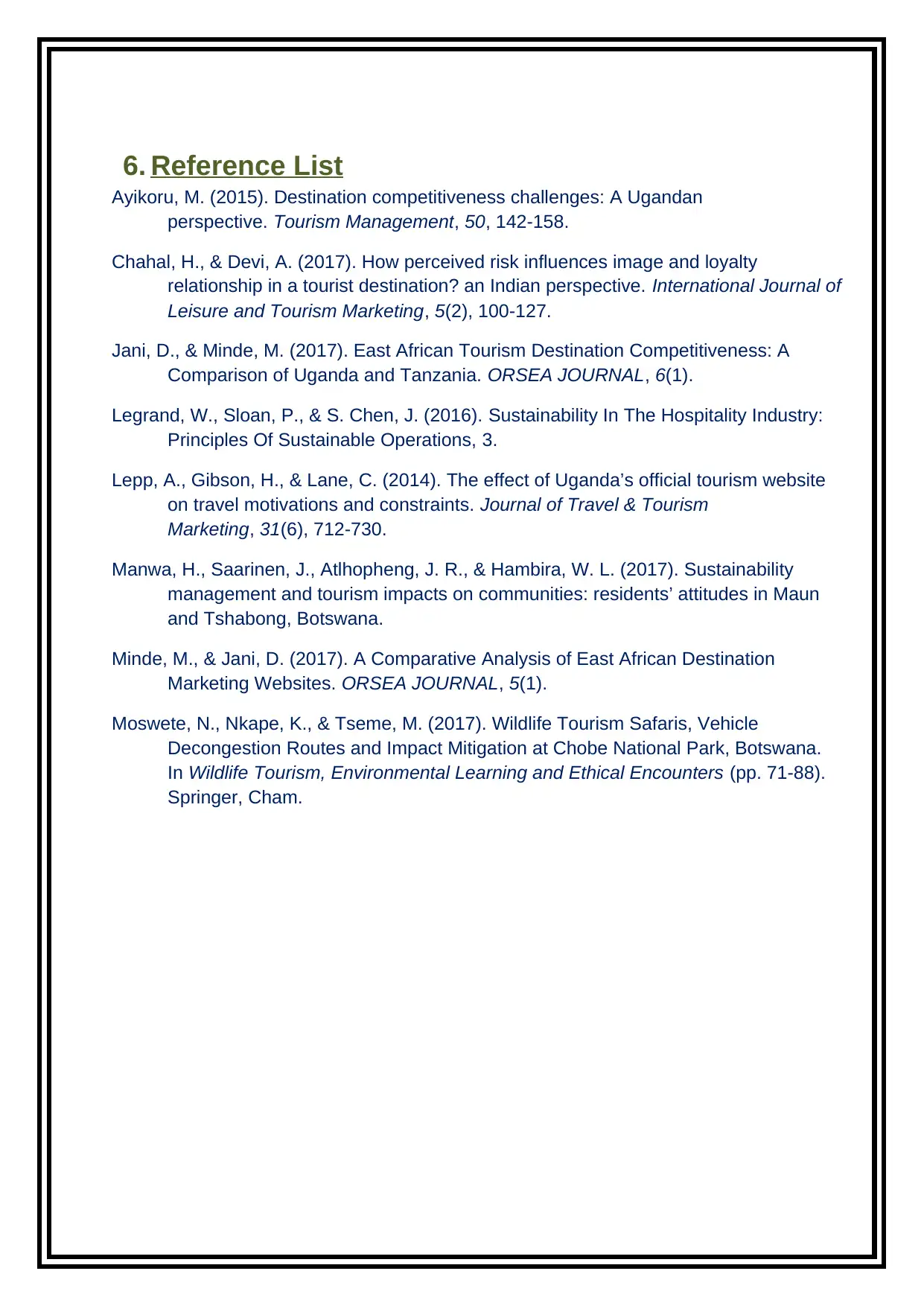
6. Reference List
Ayikoru, M. (2015). Destination competitiveness challenges: A Ugandan
perspective. Tourism Management, 50, 142-158.
Chahal, H., & Devi, A. (2017). How perceived risk influences image and loyalty
relationship in a tourist destination? an Indian perspective. International Journal of
Leisure and Tourism Marketing, 5(2), 100-127.
Jani, D., & Minde, M. (2017). East African Tourism Destination Competitiveness: A
Comparison of Uganda and Tanzania. ORSEA JOURNAL, 6(1).
Legrand, W., Sloan, P., & S. Chen, J. (2016). Sustainability In The Hospitality Industry:
Principles Of Sustainable Operations, 3.
Lepp, A., Gibson, H., & Lane, C. (2014). The effect of Uganda’s official tourism website
on travel motivations and constraints. Journal of Travel & Tourism
Marketing, 31(6), 712-730.
Manwa, H., Saarinen, J., Atlhopheng, J. R., & Hambira, W. L. (2017). Sustainability
management and tourism impacts on communities: residents’ attitudes in Maun
and Tshabong, Botswana.
Minde, M., & Jani, D. (2017). A Comparative Analysis of East African Destination
Marketing Websites. ORSEA JOURNAL, 5(1).
Moswete, N., Nkape, K., & Tseme, M. (2017). Wildlife Tourism Safaris, Vehicle
Decongestion Routes and Impact Mitigation at Chobe National Park, Botswana.
In Wildlife Tourism, Environmental Learning and Ethical Encounters (pp. 71-88).
Springer, Cham.
Ayikoru, M. (2015). Destination competitiveness challenges: A Ugandan
perspective. Tourism Management, 50, 142-158.
Chahal, H., & Devi, A. (2017). How perceived risk influences image and loyalty
relationship in a tourist destination? an Indian perspective. International Journal of
Leisure and Tourism Marketing, 5(2), 100-127.
Jani, D., & Minde, M. (2017). East African Tourism Destination Competitiveness: A
Comparison of Uganda and Tanzania. ORSEA JOURNAL, 6(1).
Legrand, W., Sloan, P., & S. Chen, J. (2016). Sustainability In The Hospitality Industry:
Principles Of Sustainable Operations, 3.
Lepp, A., Gibson, H., & Lane, C. (2014). The effect of Uganda’s official tourism website
on travel motivations and constraints. Journal of Travel & Tourism
Marketing, 31(6), 712-730.
Manwa, H., Saarinen, J., Atlhopheng, J. R., & Hambira, W. L. (2017). Sustainability
management and tourism impacts on communities: residents’ attitudes in Maun
and Tshabong, Botswana.
Minde, M., & Jani, D. (2017). A Comparative Analysis of East African Destination
Marketing Websites. ORSEA JOURNAL, 5(1).
Moswete, N., Nkape, K., & Tseme, M. (2017). Wildlife Tourism Safaris, Vehicle
Decongestion Routes and Impact Mitigation at Chobe National Park, Botswana.
In Wildlife Tourism, Environmental Learning and Ethical Encounters (pp. 71-88).
Springer, Cham.
1 out of 10
Related Documents
Your All-in-One AI-Powered Toolkit for Academic Success.
+13062052269
info@desklib.com
Available 24*7 on WhatsApp / Email
![[object Object]](/_next/static/media/star-bottom.7253800d.svg)
Unlock your academic potential
Copyright © 2020–2025 A2Z Services. All Rights Reserved. Developed and managed by ZUCOL.



